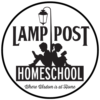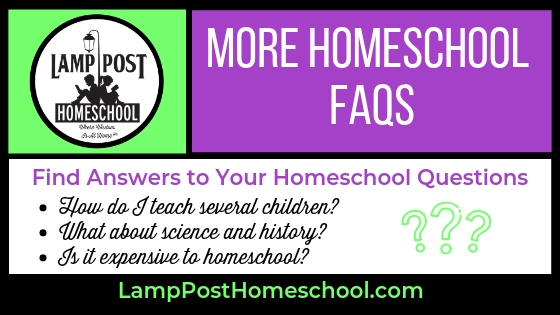Welcome to Homeschool FAQs Page 2!
Encouraging Homeschooling Articles by Harriet Yoder
- Is it expensive to purchase curriculum to teach your children?
- How do I teach several children who are all different ages?
- What about science and history in elementary school?
- What curriculum resources are available to homeschoolers?
- Start Homeschooling Half-Way Through the School Year?
- How to Start a Homeschool Support Group
Q. Is it expensive to purchase curriculum to teach your children?
Unless you live in a state which provides textbooks (for example Pennsylvania) and want to use a secular program, you will be purchasing curriculum. If your budget is limited, you can pray about it, and the Lord will show you a way whether it’s borrowing from friends and the library, purchasing used books, or some other marvelous way.
If you buy individual textbooks and teacher’s guides for each subject and each child for each grade, it can be expensive. However, at Lamp Post Homeschool our philosophy is that if you use a “real books, multi-level family” approach to teaching your children, you can save money and spend it on lasting resources to build your homeschool library. With this method, purchase those resources you will use most and borrow library books that you need occasionally. It is a multi-level family approach because you are teaching several children with the same book at once.
Q: How do I teach several children who are all different ages?
By using the multi-level approach, you can teach several children the same subject. Science and history are excellent multi-level courses. Teach the lesson to everyone and individualize the written work. Gear the activities and oral discussion to each child. One advantage of this method is that it exposes the younger children to higher levels of language and thinking skills.
It might seem that younger children may not understand a more complicated lesson, but you are planting seeds for the future. I remember hearing my father tell my older brother about square roots. I had no clue about what a square root was, but when I found out about them in my math class, I perked up and paid attention.
Q: What about science and history in elementary school?
There are several approaches to science and history in the elementary years:
Traditional Textbook Approach for Science and History
- Alpha Omega LIFEPAC Science
- Berean Builders
- BJU Elementary Science
- Alpha Omega LIFEPAC History
- BJUP Elementary Heritage Studies
- HMH Science and Social Studies
- Savvas Science and Social Studies
If you are in the first year of teaching at home, you may feel the need for more structure. You will probably be more comfortable using a textbook approach to history and science. Having a student text, a teacher’s edition, and the supplementary materials can increase your confidence in your ability to teach your children at home.
After using a traditional curriculum for a year or more, you will have learned what you like and don’t like about it. This information makes it easier to move into a less traditional type of teaching: unit studies, real books approach, etc.
Multi-level Approach for Science and History in Elementary Grades
Most elementary history and science textbooks are designed for use in a traditional classroom setting. Also, they tend to be graded readers. You may want to try a multi-level course or a unit study. You have a variety of choices in the elementary grades because most of the material usually covered in elementary grades is repeated in more detail in junior and senior high history and science courses.
The needs and goals of the homeschool setting are very different from a classroom setting. Therefore, many homeschoolers use products that were created by and for home educators.
The advantage of multi-level studies is that you can teach several students of different ages with one course. Usually, the student pages are reproducible, or the student workbooks are reasonably priced.
- America the Beautiful
- Creation or Evolution
- Great Science Adventures
- Science in the Beginning
- State History Courses
- Uncle Sam and You Civics
Real Books Approach
Using the real books approach is ideal for families who are teaching several children of different ages. Choose a science topic or historical event or period and start reading! You can make individual reading assignments or choose books to read aloud to the entire family. It is helpful to have a guide to historical fiction (Choosing Good Books). With this method, you can purchase books for your home library or borrow them from the library.
Q: What homeschooling curriculum resources are available to homeschoolers?
Today homeschooling parents can choose from a variety of creative new unit studies, history study guides, grammar workbooks, and literature guides as well as traditional Christian school textbooks and curriculum—both Christian- and secular-based.
Many multi-level resources have been written specifically for home educators by experienced home educators who weren’t satisfied with what was available. The tremendous talent of these authors blesses the homeschool movement. These products not only save you time and money but make the learning process more exciting and motivating.


